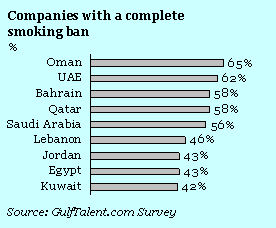98% of professionals in the Middle East prefer smoking to be banned or restricted in the workplace
Pressure is mounting on Middle East companies to ban smoking in the workplace, according to the latest survey by GulfTalent.com.
The survey found that an overwhelming 98% of professionals favour some form of smoking restriction in their workplace. Of the total respondents, who included both smokers and non-smokers, 54% preferred a complete ban on smoking inside office premises, while a further 44% believed that the workplace should be largely smoke-free, with smoking only permitted in certain designated areas.
Only 2% of professionals surveyed were completely opposed to any form of smoking restriction.
Currently around 10% of companies have no smoking restrictions in place, while a large number of companies who do have official smoking bans fail to enforce them fully – with many staff, including some senior managers, reportedly flouting the rules.
According to GulfTalent.com, many human resource departments across the region have recently introduced smoking restrictions in their workplaces. Those with restrictions already in place are looking at ways to improve compliance by staff. Some HR managers interviewed favoured stronger anti-smoking legislation by their respective governments to assist them with internal enforcement of the policy within their organisations.
Smoking Prevalence
GulfTalent.com’s survey found that overall, 33% or one-third of Middle East professionals smoke. This varies significantly by country, with Egypt and Jordan topping the list at 38%, while Oman is the lowest, with only 20% of employees smoking.

On a nationality level, smoking is most prevalent among Arab professionals at 36%, followed by Western professionals at 28% and Asian professionals at 27%.
In terms of gender, smoking is far more prevalent among men than women, with 36% of male professionals smoking compared to 18% of their female counterparts.
On a corporate level, 55% of companies currently have a complete ban on indoor smoking, while 36% permit smoking in designated areas only. The penetration of smoking bans varies greatly across the region. Oman leads the anti-smoking drive, with 65% of companies having a complete smoking ban. Kuwait is the most smoker-friendly country with only 42% of firms banning smoking in the workplace.

By industry, the healthcare sector is most health-conscious, with 74% of organisations having a complete smoking ban, partly as a result of specific anti-smoking legislation applied to the healthcare industry. The legal profession appears to be the least concerned, with only 31% of law firms applying a smoking ban.
The Smoking Debate
The issue of smoking in the workplace has assumed increasing prominence in recent months. Non-smokers are increasingly vocal in expressing their pain and suffering from smoking colleagues, while a growing body of medical evidence points to the health risks of inhaling smoke from others – the so called ‘passive smoking’. Seventy-five percent of non-smokers participating in GulfTalent.com’s survey said that they were bothered by passive smoking.
At the same time, with outside temperatures across the Gulf approaching 50 degrees Celsius, there is some public sympathy for smokers who have to leave their air-conditioned offices and stand in the blazing summer heat in order to smoke.
Legislative Developments
Overall, the Middle East countries are still among the most smoker-friendly in the world, with public bans on smoking limited or not enforced, and low tobacco taxation making the purchase of cigarettes extremely affordable. An international brand of cigarettes costs just $1.70 per pack across the UAE, Kuwait and Saudi Arabia, compared to $4.50 in the US and $11.50 in the UK.
However, the governments are increasingly under pressure to counter the spread of smoking to protect the health of their citizens, particularly the huge population of young people. Smoking-related illnesses are believed to cost Middle East governments and employers billions of dollars each year in healthcare costs and insurance premiums.
The Saudi Health Ministry recently banned smoking in government buildings, while the municipalities of Riyadh and Jeddah have banned shisha smoking in all cafes and restaurants within the city. The Dubai Municipality has promised a blanket ban on smoking in all enclosed spaces – to be enforced across all shopping malls, cafes, restaurants, universities and business premises from November 15, 2007.
The UK was the latest European country to enforce a similar public smoking ban, despite opposition from some retail outlets, including several shisha cafes in London’s Arab district.
Smoking and Productivity
Employers interviewed by GulfTalent.com were divided in their opinion on the relative productivity of smokers and non-smokers. Some believed smokers to be less productive due to frequent cigarette breaks and higher levels of sickness and absenteeism. A few employers reported having put in place a cap on maximum permitted number of cigarette breaks staff are allowed to take each day. However, the majority of employers surveyed did not believe in a link between smoking and productivity, and considered cigarette breaks to be no more disruptive than tea or coffee breaks enjoyed by non-smokers.
As far as smokers themselves are concerned, some blamed office smoking bans for lower productivity, as they would not be able to function optimally without smoking. Others welcomed the bans as an added incentive to try to quit smoking altogether.
GulfTalent.com’s study was based on an online survey of 5,000 professionals in nine major Arab countries in the Middle East and interviews with a number of HR managers. The survey was conducted as part of an exercise to understand the key issues affecting employees at work.
